Book contents
- Frontmatter
- Contents
- Introduction
- Part I Disequilibrium and Stability
- Part II Welfare Economics and Consumer Theory
- 12 Income Distribution, Value Judgments, and Welfare (1956)
- 13 Income Distribution, Value Judgments, and Welfare: A Correction (1957)
- 14 How Income Ought to Be Distributed: Paradox Lost (1961)
- 15 Advertising and Welfare: Comment (1979)
- 16 Household Equivalence Scales and Interpersonal Comparisons (1987)
- 17 Household Equivalence Scales: Reply (1990)
- 18 Normal Goods and the Expenditure Function (1990)
- Part III Applications of Microeconomic Theory
- Part IV Industrial Organization, Economics, and the Law
- Part V Public Policy Applications
- Epilogue
- Indexes
12 - Income Distribution, Value Judgments, and Welfare (1956)
Published online by Cambridge University Press: 20 March 2010
- Frontmatter
- Contents
- Introduction
- Part I Disequilibrium and Stability
- Part II Welfare Economics and Consumer Theory
- 12 Income Distribution, Value Judgments, and Welfare (1956)
- 13 Income Distribution, Value Judgments, and Welfare: A Correction (1957)
- 14 How Income Ought to Be Distributed: Paradox Lost (1961)
- 15 Advertising and Welfare: Comment (1979)
- 16 Household Equivalence Scales and Interpersonal Comparisons (1987)
- 17 Household Equivalence Scales: Reply (1990)
- 18 Normal Goods and the Expenditure Function (1990)
- Part III Applications of Microeconomic Theory
- Part IV Industrial Organization, Economics, and the Law
- Part V Public Policy Applications
- Epilogue
- Indexes
Summary
Introduction
The only remaining divergence of belief (in welfare economics) seems to be on pragmatic, tactical questions: e.g., shall all changes which could make everyone better off but which might in fact hurt some people be made mandatory in the expectation or hope that the cumulative effects of following such a rule will be better (for all or some) than if some other rule is followed? Shall we set up a rule of unanimous consent for any new change so that compensatory bribes must be in fact paid? To answer such questions we must go beyond economics.
Yes, we must go beyond economics, for it is inevitable that in discussing income distribution and its relation to welfare we must discuss value judgments, but economic analysis may enable us to see the implications of our value judgments more clearly, to discover what classes or types of value judgments lead to particular conclusions.
It is the intent of this paper to argue that the first of Samuelson's questions may be answered in the affirmative, to attempt to show that under value judgments that seem reasonably plausible, there exists a large class of situations with higher potential welfare (i.e., satisfying the Kaldor-Hicks-Scitovsky criterion) than that of the present situation, but that involves widely different income distributions, moves to which situations should be recommended. To reach such a conclusion, we shall have to discuss value judgments, both as to their implications and as to their acceptability.
- Type
- Chapter
- Information
- MicroeconomicsEssays in Theory and Applications, pp. 183 - 226Publisher: Cambridge University PressPrint publication year: 1999



